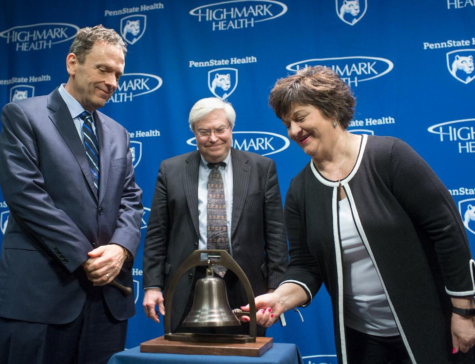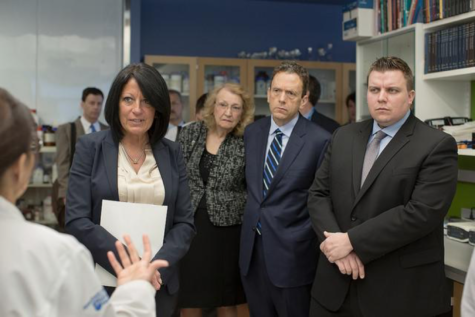Highmark Health Donates $25 Million Grant to Penn State Cancer Research
May 14, 2018
Penn State College of Medicine is one of the world’s leading universities in developing new treatment techniques for one of the most life-threatening conditions: cancer.
On April 5th Highmark Health, another healthcare company based in Pennsylvania, donated a $25 million grant to Penn State Health in an effort to further cancer research and treatment.
Since the announcement of the merger between Penn State Health and Highmark Health on December 15, 2017, a lot more news has been released in regards to the two companies aiding each other in their missions to make big strides in cancer research and development.
These include when Penn State Health and College of Medicine boosted Radiation Oncology to become its own department and when Penn State Health St. Joseph commenced the building of a 5.5 million dollar expansion on their Cancer Center.
As noted in the official press release, Dr. A. Craig Hillemeier said, “‘Penn State College of Medicine has a rich history in cancer research, from our work decades ago that contributed to the development of the world’s first cervical cancer vaccine to the many vital studies underway today that are helping us to understand how different cancers form, spread and can be effectively prevented and treated.’”
Penn State previously made a major discovery in regards to cancer prevention and treatment in January of 2017 when it played a large role in the development of the human papillomavirus (HPV) vaccine and antiviral medications. The HPV virus causes throat, anal, and cervical cancers. Susan Hafenstein, an associate professor of biochemistry and molecular biology at Penn State College of Medicine, used an imaging technique called cryo-electron microscopy to uncover many new details about the virus.
Rebecca Gingrich, who holds an administrative position in Penn State Medical Center’s Oncology Department, said that the grant will focus on expanding research abilities, hiring some of the greatest minds of cancer treatment, and conducting more clinical trials. It will generally provide a great basis for expanding cancer research.
The first contribution that will be made using the donation is the improvement of research laboratory services of Absorption, Metabolism, Excretion, and Distribution labs, according to an email sent to the Penn State Health employees. These laboratories will be used to study the effects of potential new drugs.
The grant will also be used to fund a developmental therapeutic laboratory in order to conduct Phase 1 clinical trials. According to UpToDate, Phase 1 of the clinical trial process is when doctors check the safety of the new treatments by learning the dosage and side effects. This will only be the the first step of the many new clinical trials that the grant will allow the Medical Center to perform.
The St. Joseph Medical Center’s expansion on its Cancer Center will include a lot of high end cancer treatment technology, including a TrueBeam linear accelerator. The accelerator can provide patients with an all-around better treatment experience, giving them more precision and less side effects. The TrueBeam accelerator will offer very high end cancer treatment to people that it was previously unavailable to.
Another thing that the grant will allow Penn State Medical Center to do is recruit some of the leading minds in cancer research and treatment. They have been releasing all of their big pieces of news since the merger strategically, in an effort to draw in more top researchers and new trainees.
The Penn State Cancer Institute primarily serves 28 Pennsylvania counties. According to the Office of the Dean many of those counties are medically underserved and the rates of their residents living unhealthy lifestyles are higher than the national average. The new grant will provide access to advanced cancer treatment techniques and clinical trials for some of the people in those counties that did not previously have it close to home.








